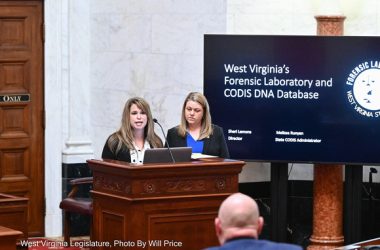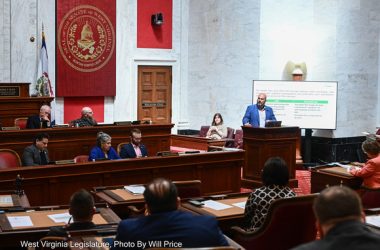By KEN WARD JR.
Charleston Gazette-Mail
CHARLESTON, W.Va. — Attorney General Patrick Morrisey has advised state regulators that he believes the state Supreme Court would rule that a controversial change in the way West Virginia calculates water pollution limits should remain in state law, despite passage of a subsequent bill that appeared to repeal that change.
In a letter to the state Department of Environmental Protection, Morrisey said his office’s review of the matter supports a conclusion that would mandate the DEP use an average streamflow, called “harmonic mean,” when setting water pollution permit limits. That conclusion would give the West Virginia Manufacturers Association and other industry groups a long-sought victory to switch to harmonic mean from the DEP’s current method, which uses a more protective low-flow figure when setting discharge limits.
In August, Caperton asked Morrisey for a legal opinion on the issue, which involves the apparent conflicts between a bill to adopt harmonic mean and a second piece of legislation to make changes the coal industry wanted in the state’s water-quality standards.
Passage of the first piece of legislation, House Bill 2506, adopted the harmonic mean flow method of calculating water pollution limits. Under the bill, the state’s water quality standards — the legal limit for in-stream contamination — won’t change. But because the average flow is always higher than the low-flow measure, the change allows the agency to approve increases in the discharges allowed by specific industrial facilities.
The second bill, Senate Bill 687, combined various state mine safety boards and sought to help mining companies combat citizen lawsuits aimed at forcing cleanup of contaminated streams. SB 687, though, inadvertently re-enacted the same section of state code that included the harmonic mean flow changes made by HB 2506, replacing the changes with the language that was in the law prior to this legislative session.
In his letter, Morrisey noted that a standard approach to the conflict would be the “last in time” rule, in which SB 687 would override HB 2506. But, Morrisey said, there was a defect in the title of SB 687, in that it did not specifically identify that the section of law containing the harmonic mean change was being revised again to its original language.
Morrisey wrote that his office therefore believes, if the matter reached the state Supreme Court, the operative section of state law would be read to include the change to harmonic mean flow and the remainder of the Senate bill, with the provision of the Senate bill that removed harmonic mean left out.
The DEP has asked the U.S. Environmental Protection Agency to review both bills, but there has been no public disclosure so far of any decision from the EPA.
See more from the Charleston Gazette-Mail





